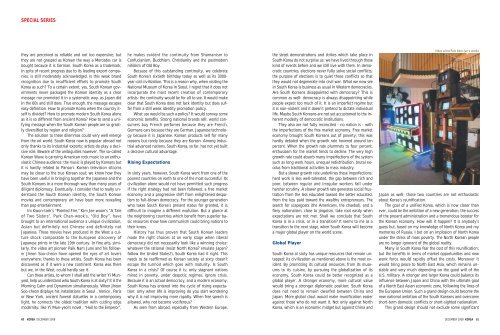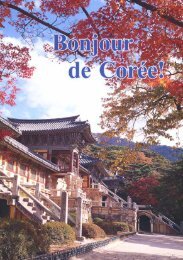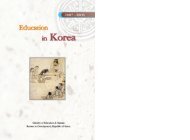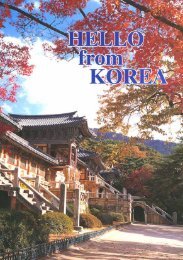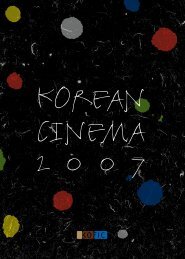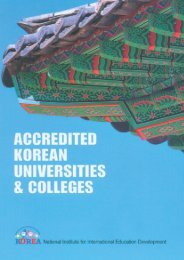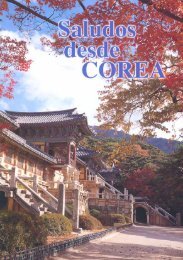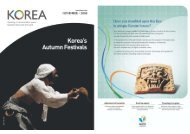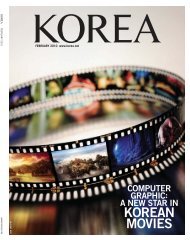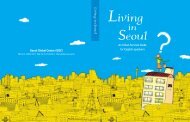Seoul Lights Up for the Holiday Season - Korea.net
Seoul Lights Up for the Holiday Season - Korea.net
Seoul Lights Up for the Holiday Season - Korea.net
Create successful ePaper yourself
Turn your PDF publications into a flip-book with our unique Google optimized e-Paper software.
SPECIAL SERIES<br />
<strong>the</strong>y are perceived as reliable and not too expensive; but<br />
<strong>the</strong>y are not grasped as <strong>Korea</strong>n <strong>the</strong> way a Mercedes car is<br />
bought because it is German. South <strong>Korea</strong> as a trademark,<br />
in spite of recent progress due to its leading export companies,<br />
is still moderately acknowledged. Is this weak brand<br />
recognition due to insufficient ef<strong>for</strong>ts to promote South<br />
<strong>Korea</strong> as such? To a certain extent, yes, South <strong>Korea</strong>n governments<br />
never packaged <strong>the</strong> <strong>Korea</strong>n identity as a clear<br />
message nor promoted it in a systematic way, as Japan did<br />
in <strong>the</strong> 60s and still does. True enough, <strong>the</strong> message escapes<br />
easy definition. How to promote <strong>Korea</strong> when <strong>the</strong> country itself<br />
is divided? How to promote modern South <strong>Korea</strong> alone<br />
as it is so different from ancient <strong>Korea</strong>? How to send a unifying<br />
message when <strong>the</strong> South <strong>Korea</strong>n people are so greatly<br />
diversified by region and religion?<br />
The solution to <strong>the</strong>se dilemmas could very well emerge<br />
from <strong>the</strong> art world. South <strong>Korea</strong> now is popular abroad not<br />
only thanks to its industrial exports; artists do play a decisive<br />
role. Beware of <strong>the</strong> ambiguities however. The so-called<br />
<strong>Korea</strong>n Wave is carrying American rock music to an enthusiastic<br />
Chinese audience: <strong>the</strong> music is played by <strong>Korea</strong>ns but<br />
it is hardly related to Pansori. <strong>Korea</strong>n television sitcoms<br />
may be closer to <strong>the</strong> true <strong>Korea</strong>n soul; we know how <strong>the</strong>y<br />
have been useful in bringing toge<strong>the</strong>r <strong>the</strong> Japanese and <strong>the</strong><br />
South <strong>Korea</strong>ns in a more thorough way than many years of<br />
diligent diplomacy. Eventually, I consider that to really understand<br />
<strong>the</strong> South <strong>Korea</strong>n identity, <strong>the</strong> South <strong>Korea</strong>n<br />
movies and contemporary art have been more revealing<br />
than pop entertainment.<br />
Im Kwon-taek’s “Painted Fire,” Kim Jee-woon’s “A Tale<br />
of Two Sisters”, Park Chan-wook’s, “Old Boy”, have<br />
brought to an international audience a unique civilization,<br />
Asian but definitely not Chinese and definitely not<br />
Japanese. These movies have produced in <strong>the</strong> West a culture<br />
shock comparable to <strong>the</strong> European discovery of<br />
Japanese prints in <strong>the</strong> late 19th century. In fine arts, similarly,<br />
<strong>the</strong> video art pioneer Paik Nam June and his follower<br />
Jheon Soo-cheon have opened <strong>the</strong> eyes of art lovers<br />
everywhere; thanks to <strong>the</strong>se artists, South <strong>Korea</strong> has been<br />
discovered as if it were a new continent. <strong>Korea</strong> was <strong>the</strong>re<br />
but we, in <strong>the</strong> West, could hardly see it.<br />
Can <strong>the</strong>se artists, to whom I shall add <strong>the</strong> writer Yi Munyeol,<br />
help us understand who South <strong>Korea</strong> is at sixty? It is <strong>the</strong><br />
Morning Calm and Dynamism simultaneously. When Jheon<br />
Soo-cheon displays his installations in <strong>Seoul</strong> , Venice , Paris<br />
or New York, ancient funeral statuettes in a contemporary<br />
light, he connects <strong>the</strong> oldest tradition with cutting edge<br />
modernity: like Yi Mun-yeol’s novel , “Hail to <strong>the</strong> Emperor”,<br />
he makes evident <strong>the</strong> continuity from Shamanism to<br />
Confucianism, Buddhism, Christianity and <strong>the</strong> postmodern<br />
nihilism of Old Boy.<br />
Because of this outstanding continuity, we celebrate<br />
South <strong>Korea</strong>’s sixtieth birthday today as well as its 3000-<br />
year-old civilization. This is a reason why, when visiting <strong>the</strong><br />
National Museum of <strong>Korea</strong> in <strong>Seoul</strong>, I regret that it does not<br />
incorporate <strong>the</strong> most recent creation of contemporary<br />
artists: <strong>the</strong> continuity would be <strong>for</strong> all to see. It would make<br />
clear that South <strong>Korea</strong> does not lack identity but does suffer<br />
from a still weak identity promotion policy.<br />
What use would be such a policy? It would convey some<br />
economic benefits. Strong national brands sell: world consumers<br />
buy French perfumes because <strong>the</strong>y are French,<br />
Germans cars because <strong>the</strong>y are German, Japanese technology<br />
because it is Japanese. <strong>Korea</strong>n products sell <strong>for</strong> many<br />
reasons but rarely because <strong>the</strong>y are <strong>Korea</strong>n. Among industrial<br />
advanced nations, South <strong>Korea</strong>, so far, has not yet built<br />
a decisive cultural advantage.<br />
Rising Expectations<br />
In sixty years, however, South <strong>Korea</strong> went from one of <strong>the</strong><br />
poorest countries on earth to one of <strong>the</strong> most successful. Its<br />
civilization alone would not have permitted such progress<br />
if <strong>the</strong> right strategy had not been followed, a free market<br />
economy and a progressive shift from enlightened despotism<br />
to full-blown democracy. For <strong>the</strong> younger generation<br />
who takes South <strong>Korea</strong>’s present status <strong>for</strong> granted, it is<br />
difficult to imagine a different evolution. But a glance at<br />
<strong>the</strong> neighboring countries which benefit from superior basic<br />
resources show how communism could bring nations to<br />
<strong>the</strong>ir knees.<br />
History has thus proven that South <strong>Korea</strong>n leaders<br />
made <strong>the</strong> right choices at an early stage when liberal<br />
democracy did not necessarily look like a winning choice:<br />
whatever <strong>the</strong> rational (resist North <strong>Korea</strong>? emulate Japan?<br />
follow <strong>the</strong> United States?), South <strong>Korea</strong> had it right. This<br />
needs to be reaffirmed as <strong>Korea</strong>n society at sixty doesn’t<br />
escape <strong>the</strong> turmoil which goes with maturity. Is South<br />
<strong>Korea</strong> in a crisis? Of course it is; only stagnant nations<br />
mired in poverty, under despotic regimes, ignore crisis.<br />
Because it is an actual democracy, and a modern economy,<br />
South <strong>Korea</strong> has entered into <strong>the</strong> cycle of rising expectation:<br />
only when life is improving do you start wondering<br />
why it is not improving more rapidly. When free speech is<br />
allowed, why not become vociferous?<br />
As seen from abroad, especially from Western Europe,<br />
<strong>the</strong> street demonstrations and strikes which take place in<br />
South <strong>Korea</strong> do not surprise us: we have lived through those<br />
kind of events be<strong>for</strong>e and we still live with <strong>the</strong>m. In democratic<br />
countries, elections never fully solve social conflicts;<br />
<strong>the</strong> purpose of elections is to quiet those conflicts so that<br />
<strong>the</strong>y would not degenerate into civil war. What we now see<br />
in South <strong>Korea</strong> is business as usual in Western democracies.<br />
Are South <strong>Korea</strong>ns disappointed with democracy? This is<br />
common as well: democracy is always disappointing while<br />
people expect too much of it. It is an imperfect regime but<br />
it is non-violent and it doesn’t pretend to dictate individual<br />
life. Maybe South <strong>Korea</strong>ns are not yet accustomed to <strong>the</strong> inherent<br />
modesty of democratic institutions.<br />
They also are not fully reconciled - no nation is - with<br />
<strong>the</strong> imperfections of <strong>the</strong> free market economy. Free market<br />
economy brought South <strong>Korea</strong>ns out of poverty; this was<br />
hardly debated when <strong>the</strong> growth rate hovered around ten<br />
percent. When <strong>the</strong> growth rate plummets to four percent,<br />
enthusiasm <strong>for</strong> <strong>the</strong> market tends to decline. The very high<br />
growth rate could absorb many imperfections of <strong>the</strong> system<br />
such as long work hours, unequal redistribution, brutal exodus<br />
from traditional activities to mass industry.<br />
But a slower growth rate underlines <strong>the</strong>se imperfections:<br />
hard work is less well-tolerated, <strong>the</strong> gap between rich and<br />
poor, between regular and irregular workers fall under<br />
harsher scrutiny. A slower growth rate generates social frustration<br />
from <strong>the</strong> less educated toward <strong>the</strong> better educated,<br />
from <strong>the</strong> less paid toward <strong>the</strong> wealthy entrepreneurs. The<br />
search <strong>for</strong> scapegoats (<strong>the</strong> Americans, <strong>the</strong> chaebol), and a<br />
fiery nationalism, close to jingoism, take root easily when<br />
expectations are not met. Shall we conclude that South<br />
<strong>Korea</strong> is in a crisis, or in a transition? It seems to me as a<br />
transition to <strong>the</strong> next stage, when South <strong>Korea</strong> will become<br />
a major global player on <strong>the</strong> world scene.<br />
Global Player<br />
South <strong>Korea</strong> at sixty has unique resources that remain untapped:<br />
its civilization as mentioned above is <strong>the</strong> most evident.<br />
By promoting its cultural resources, from its museums<br />
to its cuisine, by pursuing <strong>the</strong> globalization of its<br />
economy, South <strong>Korea</strong> could be better recognized as a<br />
global player. A stronger economy, more cultural value<br />
would bring a stronger diplomatic position; South <strong>Korea</strong><br />
does not need to remain dwarfed between China and<br />
Japan. More global clout would make reunification easier<br />
against those who do not want it. Not only against North<br />
<strong>Korea</strong>, which is an economic midget but against China and<br />
Video artist Paik Nam-jun’s works<br />
Japan as well; those two countries are not enthusiastic<br />
about <strong>Korea</strong>’s reunification.<br />
The goal of a unified <strong>Korea</strong>, which is now closer than<br />
ever, could be <strong>the</strong> ambition of a new generation, <strong>the</strong> success<br />
of <strong>the</strong> present administration and a tremendous booster <strong>for</strong><br />
<strong>the</strong> <strong>Korea</strong>n economy. How will it happen? It is anybody’s<br />
guess but, based on my knowledge of North <strong>Korea</strong> and my<br />
memories of Russia, I bet on an implosion of North <strong>Korea</strong><br />
under <strong>the</strong> stress of mass poverty. The North <strong>Korea</strong>n people<br />
are no longer ignorant of <strong>the</strong> global reality.<br />
Many in South <strong>Korea</strong> fear <strong>the</strong> cost of this reunification;<br />
but <strong>the</strong> benefits in terms of market opportunities and new<br />
work <strong>for</strong>ce would rapidly offset <strong>the</strong> costs. Moreover it<br />
would bring peace to North East Asia, which remains unstable<br />
and very much depending on <strong>the</strong> good will of <strong>the</strong><br />
U.S. military. A stronger and larger <strong>Korea</strong> could balance its<br />
influence between Japan and China with <strong>the</strong> ultimate goal<br />
of a North East Asian economic zone, following <strong>the</strong> lines of<br />
<strong>the</strong> European Union. Such a grand design could become <strong>the</strong><br />
new national ambition of <strong>the</strong> South <strong>Korea</strong>ns and overcome<br />
short-term domestic conflicts or short-sighted nationalism.<br />
This grand design should not exclude some significant<br />
60 KOREA DECEMBER 2008<br />
DECEMBER 2008 KOREA 61


